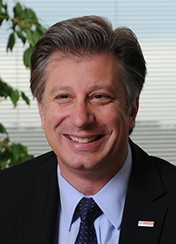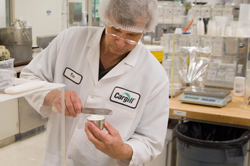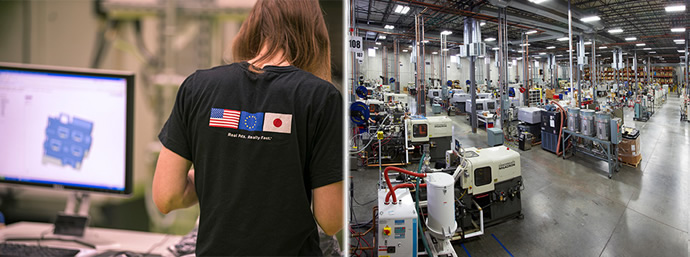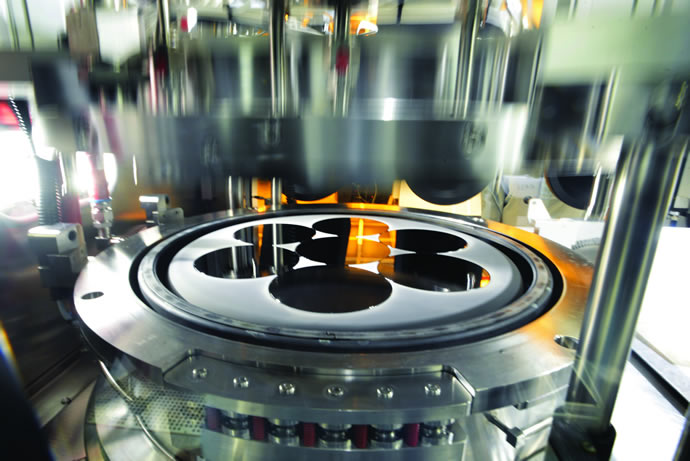You may not find pilgrims in these places, but you will most definitely find pioneers.
Site Selection’s “What’s In a Name?” series in the past has surveyed the world for corporate facility investments in places named Springfield, Independence and Columbus. This week, in honor of the first US Thanksgiving celebration in Plymouth, Mass., we look in on some of the approximately 40 projects that have located over the past three years in nine places named Plymouth.
They include three investments in cheese manufacturing in Plymouth, Wis.; life sciences R&D in Plymouth Meeting, Pa., from ProTecs; a $15-million dried fruit processing investment from Zentis Food Solutions North America in Plymouth, Ind; and even some ice cream and ice cream cone investments in Plymouth County, Iowa (the home of Wells Dairy).

“Essential to attracting and retaining the best associates is also having thriving communities in which they can work, live and play. Plymouth Township offers this kind of environment.”
The leading Plymouth? Well, it’s actually two: Plymouth and Plymouth Township, Mich., are home to some of the globe’s pioneering automotive research, and have welcomed 15 projects qualified for our Conway Projects Database since January 2012. They include a $59-million, 466-job investment last year from Magna International subsidiary Autosystems America; a $36-million, 200-job investment from Robert Bosch; and a $27-million, 121-job project from Hyundai Mobis North America. (Entry into the database requires meeting one of three criteria: at least $1 million invested; at least 20 new jobs created; or at least 20,000 new sq. ft. of space.)
The Bosch expansion, designed by locally based but globally known architecture firm Harley Ellis Devereaux, broke ground in August 2014 and was expected to be complete this month, doubling the size of the existing technical center, which opened in 2007. When complete, the total site, located on 75 acres (30 hectares), will have more than 445,000 sq. ft. (41,340 sq. m.) and capacity for 1,400 people.

“The expansion will further enable the growth of several key technologies,” said Bosch last year, “including automotive electronics, start/stop motors, electrical drives, and a variety of safety and driver assistance systems that will further advance automated driving. In addition, the new site will provide Bosch with the needed laboratory and office space to co-locate certain associates in southeast Michigan, some of whom currently work in different leased facilities, thereby fostering more innovation and greater collaboration.”
The Plymouth Technical Center housed 850 people at the time of that groundbreaking. The site is part of a Bosch portfolio in the state that altogether includes 3,200 employees in 15 cities, including Farmington Hills, which is the headquarters for Robert Bosch LLC; Ann Arbor; Bridgeport; Buchanan; Canton; Flat Rock; Kalamazoo; Kentwood; Orion; Novi; Rochester Hills; St. Joseph; and Warren.
“It has long been our hope to expand the technical center here,” said Robert Bosch LLC President Mike Mansuetti last August, noting the assistance of the Plymouth Township Board of Trustees and Planning Commission, along with county and state agencies, when the first construction began in 2005. “As we built the business case for further expansion, the township allowed Bosch to construct a temporary building on site for about 160 associates, thereby enabling Bosch to keep these jobs in Plymouth Township.”
Earlier this year, one of the many foreign investments in the Plymouth area came from Italian fastener pioneer Brugola, named after the inventor and company founder Egidio Brugola, who in 1945 patented a bolt design with a hexagonal socket head and spiral shank. The company’s Michigan plant is its first outside of Italy.
Other prominent automotive R&D in the region comes from such companies as Isuzu, Johnson Controls, Tower Automotive, TRAM, Freudenberg NOK, BREMBO and Aisin, which like Bosch is also expanding its technical center, with a $33-million investment. All in the same area that gave birth to the Slinky (from Poof Manufacturing) and to Humanetics Innovative Solutions, the global leader in the design, development and manufacturing of anthropomorphic test devices (ATDs) — otherwise known as crash test dummies.
Sweet Spot for Brain Power
Staffed with over 200 employees, including over 50 engineers and technical personnel, at its Plymouth home, Humanetics works on a consulting basis with the Recalibration Laboratory at Wayne State University in Detroit, the University of Michigan Transportation Research Institute in Ann Arbor and the University of Dayton in Ohio. That sort of networked intelligence is indicative of an area known for its forward-looking minds and mindset.

Located 16 miles east of Ann Arbor and 25 miles from Detroit proper, 42 percent of the workforce in Plymouth and Plymouth Township has at least a bachelor’s degree — 18 percent higher than the national average. They’re part of a Metro Detroit region that boasts the highest concentration of engineers in the nation, as well as a growing population of more than 350,000 IT professionals.
The area workforce springs from a school system that’s been diverse for a long time. Just check the resumés of Chinese automotive company executives. Or look at the Web resources of the Plymouth Community Chamber of Commerce, which is not shy or PC about touting it: “There are even a significant number of Asian and Indian students in the schools making them attractive and comfortable for the many overseas families who come here for work,” they say. The Plymouth Canton Community School district is the fourth largest district in Michigan, with almost 19,000 students.
Bosch is doing its part, having given $70,000 to the FIRST Plymouth Canton Schools Team 862 Lightning Robotics since establishing its foundation in 2011. Now Bosch is establishing a new partnership with Schoolcraft College, known for its manufacturing and technology curriculum, by working with two Bosch-sponsored FIRST Robotics teams in Schoolcraft College’s labs during the 2015 season.
Fertile Grounds
Trailing Michigan’s Plymouth in total projects is the one that started it all in the US: Plymouth County in Massachusetts, where the 102 original pilgrims staggered ashore. About half a dozen investments over the past few years have made landfall in Bridgewater, West Bridgewater, Brockton, Wareham and Abington.

The largest investments have come from Cheer Pack North America in West Bridgewater ($25 million, 77 new jobs in September 2012); Chatham Village All-Natural Croutons in Wareham ($9 million, 165 jobs); and office supply firm WB Mason, whose headquarters expansion involved a $6-million investment and 323 jobs in Brockton. Based there since it was a small warehouse in 1898, the company has grown to become the largest, privately owned office products dealer in the United States, with over 30 locations spanning 11 states.
The area is also home to Plantation Products, the largest packet seed and seed starting company in North America. The company fills over 180 million seed packets annually and distributes products to over 60,000 retail outlets from three facilities in Norton, Mass.; West Bridgewater; and Brandon, Manitoba, Canada.
Not all the growth in the area is big companies. South Eastern Economic Development (SEED) Corp. announced in October that, during Fiscal Year 2015 just ended on September 30, it made 76 small business loans totaling $22.1 million, and assisting in the creation of 339 new jobs. The loans were made to businesses in the region under all of SEED’s loan programs, which range from micro loans up to $50,000, small loans up to $200,000, and SBA 504 loans up to $5.5 million.
“Without SEED’s loans many small businesses would not be able to operate or take on expansion projects,” said Maria Gooch-Smith, SEED’s executive director. “These loans also leveraged $29.3 million in bank loans and private funds.”
High Tech in the Twin Cities
Coming in third in the Plymouth sweepstakes is the Twin Cities suburb of Plymouth, Minn., whose six projects over three years pack quite a punch. They include two major expansions in 2012 involving over 400 jobs from medical device giant St. Jude Medical; a $15-million, 100-job investment from Proto Labs; another 100-job expansion at the HQ of Polaris Industries; and a 20-job, $2-million HQ expansion from Monteris Medical.
Among the most recent projects to land in Plymouth is a $6-million R&D expansion from Cargill, whose original investment in an R&D center for biobased polyols and polymers occurred in 2007. The facility includes a pilot production area to simulate customer production plants for testing of new products. Cargill has been based in Minnesota since its founding 150 years ago, and maintains its HQ in Wayzata, just next door to Plymouth.
The new $5.5-million investment in Plymouth is a food innovation center where the company’s own researchers work side-by-side with customers’ staff. The investment doubled the facility’s size to 40,000 sq. ft. (3,716 sq. m.).

“We wanted to find the best way to satisfy the product research and development needs of our customers in food and beverage manufacturing and the food service industry,” said Kerr Dow, Cargill vice president of global food technology, at the facility’s grand opening in August 2014. “So, we designed a facility we believe will promote collaboration, accelerate innovation and help our customers reduce product development cycles.”
Featuring specialized areas devoted to bakery applications, frying oils and sensory testing, the center the company’s primary R&D facility serving food and beverage manufacturers and food service customers in North America. Cargill’s network of Global Cargill Innovation Centers includes recently established new locations in Campinas, Brazil; Wichita, Kan.; and New Delhi, India; and an expanded European Research and Development Center in Vilvoorde, Belgium.
Proto Labs, one of Fortune magazine’s 100 fastest-growing companies, is based in nearby Maple Plain, Minn. The company specializes in CNC machining and quick-turn prototyping, including a rapidly expanding 3D printing division that just acquired a new facility in North Carolina and acquired a German firm with locations across Europe.
Full Circle
The reach of innovation in places named Plymouth extends to the original Plymouth whence the pilgrims fled those four centuries ago.
The Plymouth area (so named because it’s at the mouth of the Plym River), welcomed a 100-job investment not long ago from Japan’s Kawasaki Precision Machinery. But this year’s big news is a $100-million investment from Plessey Semiconductor, a leader in silicon LED manufacture and the integration of sensing, measurement and control for a variety of lighting applications.

Plessey announced the investment in September after securing a £30-million ($50-million) loan from Deutsche Bank AG to finance it. The expansion will increase the company’s production capabilities by a factor of 30, more than tripling its workforce to about 535 employees. Plessey says its GaN-on-Silicon technology “has the ability to cut the cost of LED lighting by using standard silicon manufacturing techniques instead of more traditional, expensive, sapphire-based manufacturing.”
According to a new market research report, the solid-state lighting market size is projected to reach $22.2 billion by 2020, growing at a compounded annual growth rate of 7.31 percent from 2015 to 2020.
“The bank has come up with a progressive flexible facility that supports our expansion plans for our manufacturing capacity here in Plymouth,” said Iain Silvester, Plessey’s CFO. “Plessey will increase its manufacturing capacity from over 100 million square millimeters of Gallium Nitride material per year to more than 3 billion square millimeters. The facility modifications, which are also supported by £6.7 million from the Regional Growth Fund, will take place during 2015, with additional manufacturing tools and facilities coming on stream through the end of this year through to 2017. During this time we expect about 400 new jobs to be created.”
The project is riding a wave of interest in reindustrialization in England, led by an effort called Made Here Now that is supported by 47 very influential organizations and companies.
“The expansion is highly significant for the company, but also for British high-tech manufacturing,” said Michael LeGoff, Plessey’s CEO. “It aligns well with national strategies, such as the Growth Review, that support manufacturing and make the UK a global leading exporter of high value goods.”
The pilgrims, it appears, have returned.

